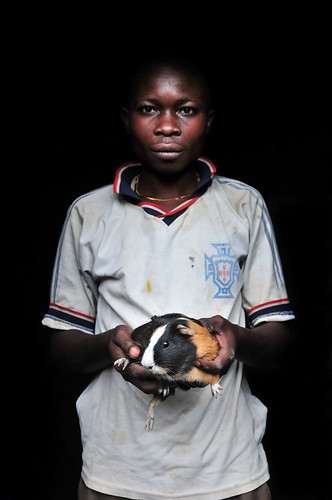A guinea pig keeper in the North Kivu Province of DR Congo (photo credit: Neil Palmer/CIAT).
Humidtropics, a major new research-for-development program launched today, aims at increasing average farm income by 50% with 25% of poor households lifted above the poverty line in the humid tropics in the next 15 years.
The humid tropics—the vast hot and wet areas spanning the equator that are home to some 2.9 billion people living on 3 billion hectares of land—support the guinea pig keepers of North Kivu Province in DR Congo, the cocoa plantations of West Africa, the plantain/banana systems of East and Central Africa, the mixed crop-livestock systems of Central America and the Caribbean and the intensively farmed crop-and-livestock systems of Asia.
Most of the world’s rural poor live in the world’s humid tropics, which are critical to ensuring global food supplies, maintaining global biodiversity, reducing global warming and, last but certainly not least, empowering women with precious few other options for making a living and feeding their children.
Research leading to production system intensification will boost yields of staple crops and help to reduce the number of malnourished children by 30%.
This new CGIAR research program will help poor women and farm families boost their agricultural productivity while conserving their land and natural resources.
Participants in this new CGIAR research program include the world’s leading agricultural research institutions: Bioversity International, the Forum for Agricultural Research in Africa (FARA), the International Centre of Insect Physiology and Ecology (icipe), the International Center for Tropical Agriculture (CIAT), the International Livestock Research Institute (ILRI), the International Potato Center (CIP), the International Water Management Institute (IWMI), the World Agroforestry Centre (ICRAF), Wageningen University and the World Vegetable Center (AVRDC).
If you are interested in this new program, please register at http://humidtropics.org/contact.
For more information, contact Humidtropics Office, Humidtropics@cgiar.org

